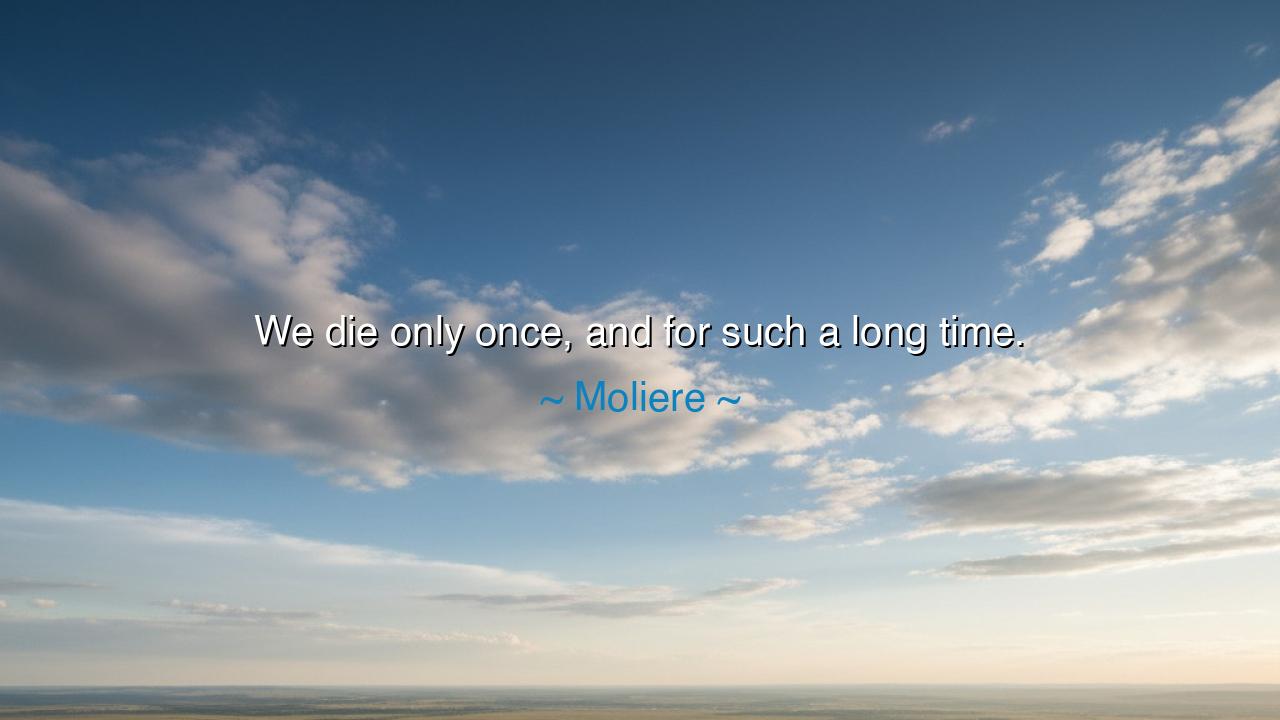
We die only once, and for such a long time.






Hear, O children of the fleeting world, the words of Molière, the great playwright of France, who clothed wisdom in laughter and truth in jest. He once said, “We die only once, and for such a long time.” In this phrase, wrapped in irony yet heavy with reflection, Molière reminds us of the fragility of existence — that death is but a single moment, yet its silence stretches into eternity. He speaks not merely of the final breath, but of the sacred urgency of life, urging us to awaken before the long stillness claims us.
Molière, born Jean-Baptiste Poquelin, was a man who knew both the glory of the stage and the shadow of mortality. He lived in an age when illness and hypocrisy walked hand in hand, when laughter was both rebellion and remedy. In his plays, he mocked the false piety of men who feared death but wasted life. Thus, when he said we “die only once,” he was not lamenting the end — he was warning against living as though already dead. The “long time” of death is not tragedy in itself, but the contrast it draws against the short fire of our days.
The ancients, too, spoke this truth in their own tongue. The Stoic Seneca wrote: “It is not that we have a short time to live, but that we waste much of it.” Death comes but once, yet how often do we lose our hours to worry, pride, or fear? Molière’s line echoes that same call — to live intensely and deliberately, for we are creatures of passing light. If death lasts forever, then every heartbeat before it must be cherished as a miracle. It is not the brevity of life that wounds us, but our blindness to its worth.
Consider the tale of Anne Frank, the young girl who wrote her heart into history from behind the walls of captivity. Her life was short — barely fifteen years — yet her words still breathe across centuries: “How wonderful it is that nobody need wait a single moment before starting to improve the world.” She understood, even in the shadow of death, that what matters is not how long we live, but how fully. She died once, but her courage lives on — proof that a single bright flame can outlast the endless dark.
Thus Molière’s words carry both warning and wisdom. If death is long and certain, and life brief and uncertain, then the wise do not delay their living. They do not wait for perfect days, nor hoard their joy for later years. Every act of kindness, every laugh shared, every sunrise witnessed is an act of defiance against eternity’s silence. To live well is the only victory time allows. And to delay life out of fear of death is to die twice — once in the body, and once in the spirit.
Yet Molière’s wit also humbles us. He does not speak from despair, but from understanding. His laughter, sharp as it was, sprang from love — love for the foolishness of humankind and for the fleeting beauty of our existence. He reminds us that life, for all its struggle, is precious precisely because it ends. The knowledge that “we die only once” should not fill us with dread but with gratitude, for it teaches us to hold each moment as sacred, each breath as borrowed treasure.
So take this lesson, O listener of mortal heart: live before you die. Do not wait for tomorrow’s certainty, for tomorrow belongs to death’s dominion. Speak the words you have withheld, forgive the wrongs that bind you, and dare to love without hesitation. For one day, the curtain will fall, and the play of your life will end — but until that day, let your laughter, your kindness, your courage echo through the hall of time.
And when death at last arrives, as it surely will, greet it not with fear but with peace. Say to it, “I have lived.” For though we die only once, we may live a thousand times — in every sunrise, every act of beauty, every heart we touch. The long sleep will come, yes — but let it find you awake, radiant, and unafraid, for you have filled your brief hour with the glory of being alive.






AAdministratorAdministrator
Welcome, honored guests. Please leave a comment, we will respond soon